2015届高考英语复习--基本句型
图片预览
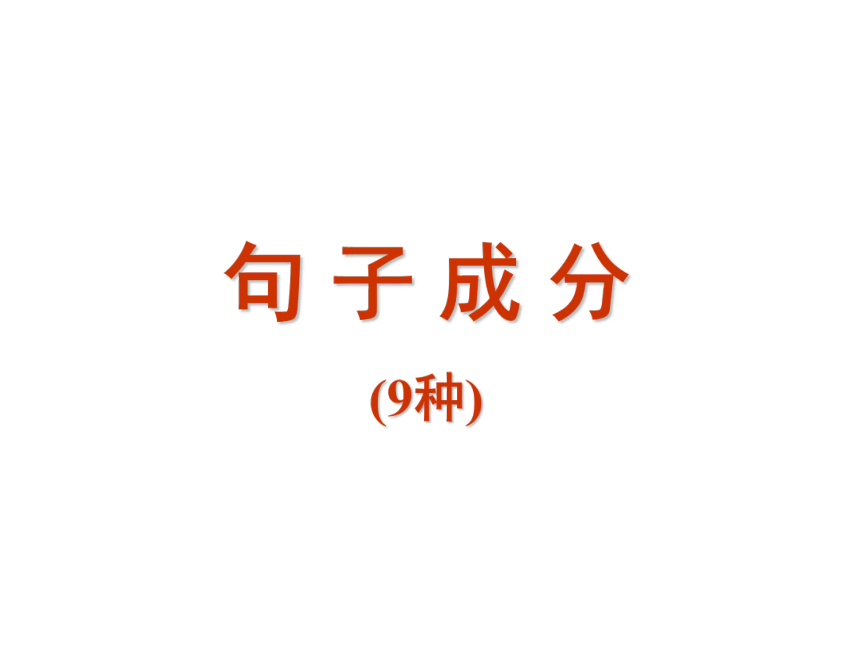
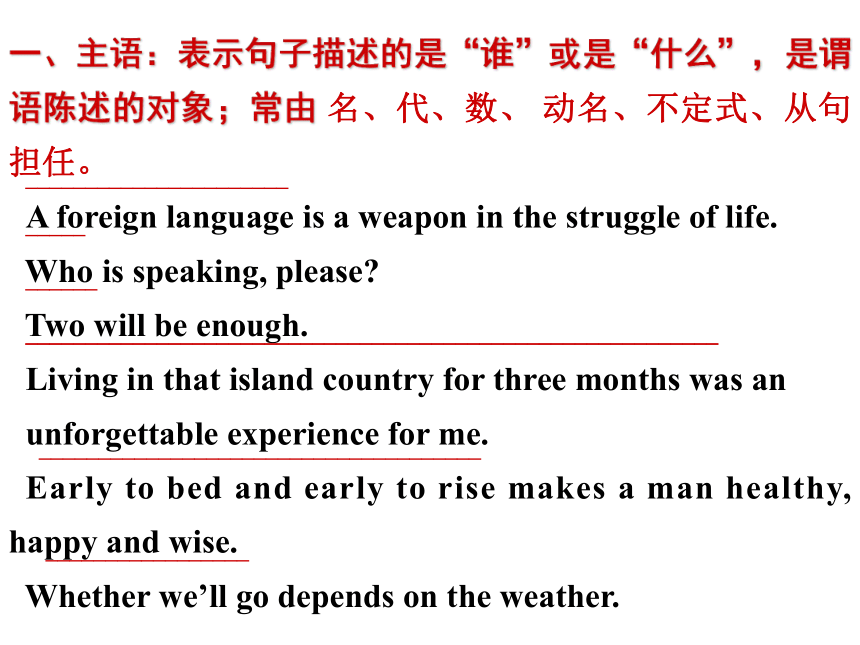
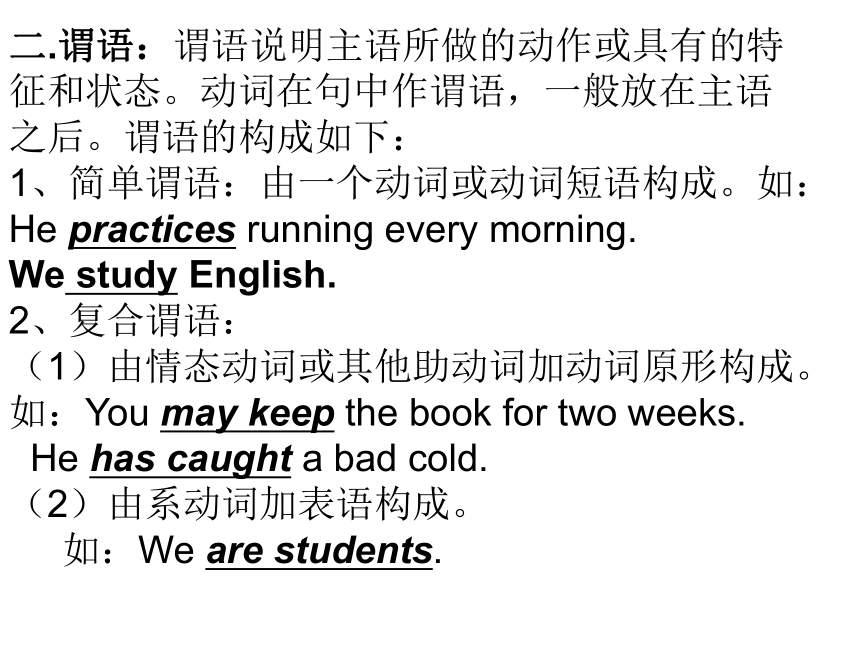
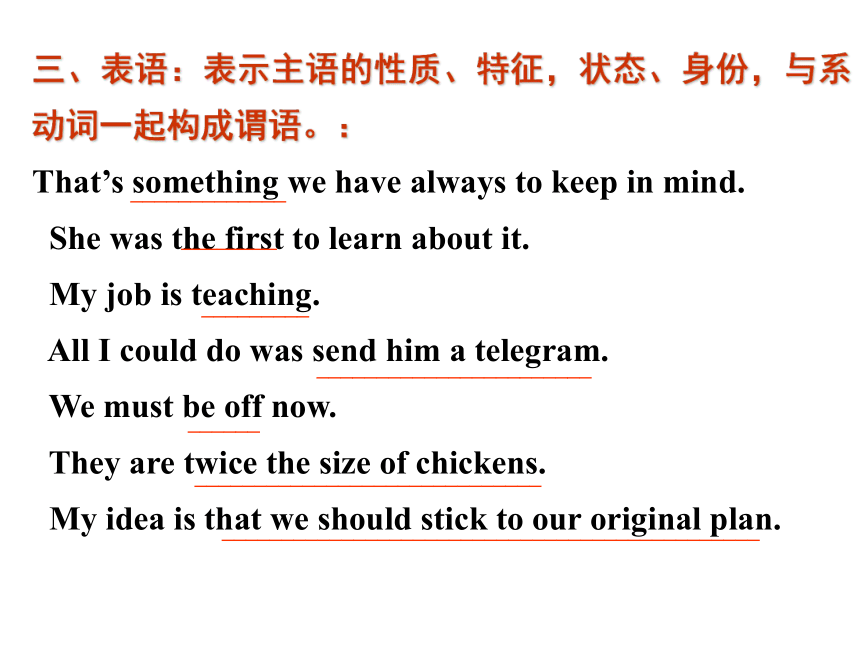
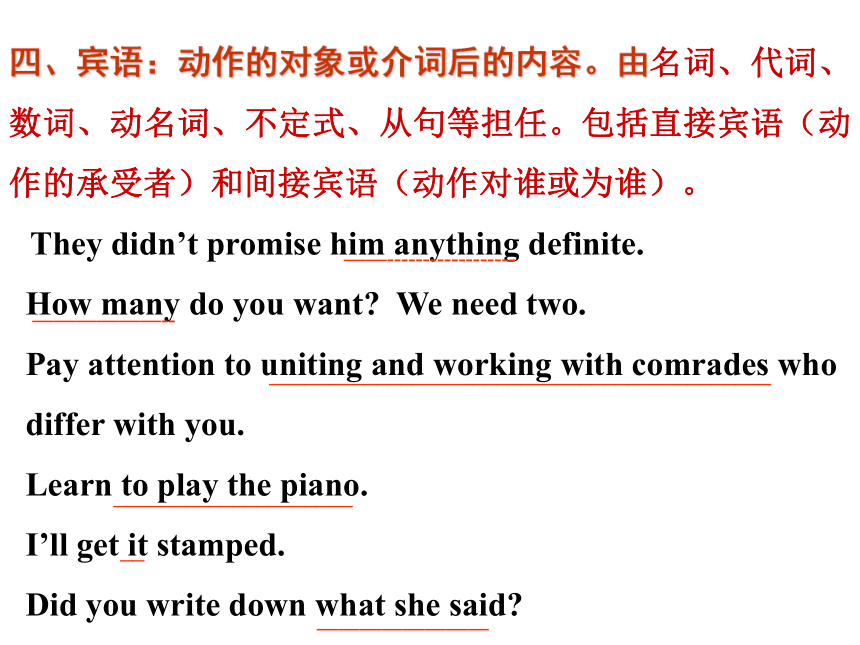
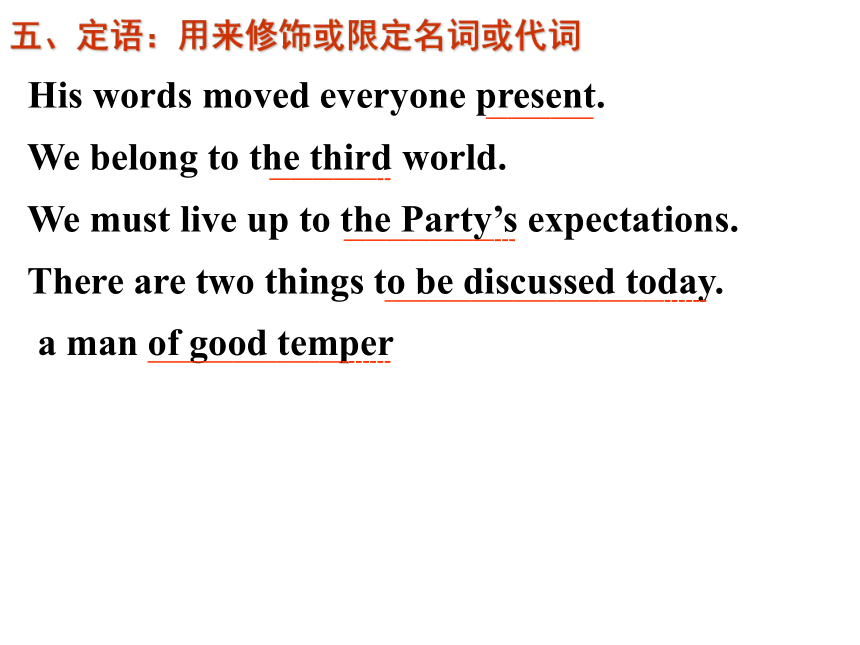

文档简介
课件17张PPT。句 子 成 分
(9种)一、主语:表示句子描述的是“谁”或是“什么”,是谓语陈述的对象;常由 名、代、数、 动名、不定式、从句担任。
A foreign language is a weapon in the struggle of life.
Who is speaking, please?
Two will be enough.
Living in that island country for three months was an
unforgettable experience for me.
Early to bed and early to rise makes a man healthy, happy and wise.
Whether we’ll go depends on the weather.
_________________________________________________________________________________________________________________________________________________
二.谓语:谓语说明主语所做的动作或具有的特征和状态。动词在句中作谓语,一般放在主语之后。谓语的构成如下:
1、简单谓语:由一个动词或动词短语构成。如:He practices running every morning.
We study English.
2、复合谓语:
(1)由情态动词或其他助动词加动词原形构成。如:You may keep the book for two weeks.
He has caught a bad cold.
(2)由系动词加表语构成。
如:We are students.三、表语:表示主语的性质、特征,状态、身份,与系动词一起构成谓语。:
That’s something we have always to keep in mind.
She was the first to learn about it.
My job is teaching.
All I could do was send him a telegram.
We must be off now.
They are twice the size of chickens.
My idea is that we should stick to our original plan.________________________________________________________________________________________________________________________ _____________四、宾语:动作的对象或介词后的内容。由名词、代词、数词、动名词、不定式、从句等担任。包括直接宾语(动作的承受者)和间接宾语(动作对谁或为谁)。
They didn’t promise him anything definite.
How many do you want? We need two.
Pay attention to uniting and working with comrades who
differ with you.
Learn to play the piano.
I’ll get it stamped.
Did you write down what she said? ——————--____________________——------------------————————____________________________________________五、定语:用来修饰或限定名词或代词
His words moved everyone present.
We belong to the third world.
We must live up to the Party’s expectations.
There are two things to be discussed today.
a man of good temper——————————--———————---—————————————------—————————-------六、状语:修饰动、形、副、或整个句子。常由
副词.介词短语,不定式分词形容词,复合结构.从句担任。 They were greatly touched to hear the old man’s story. (副词)
They did everything they could to save the boy’s life. (不定式)
I said it in fun. (介词短语)
They returned tired and hungry. (形容词)
We are working day and night。(词组)
Seeing this, some students became very worried. (分词)
He entered the room, with a book in his hand. (复合结构) _________________________________________________________________________________________________________________七、 补语:补充说明主语或宾语用的。常由形、名、代、
数担任。
We elected him monitor.
He was elected monitor.
We made them very happy
八、 同位语: 对前面的名或代做进一步的解释。
This is Mr. Zhou, our headmaster.
His teacher’s suggestion he leave for the USA may
be right.
九、 插入语:对一句话作一些附加的解释。
To be frank, I don’t agree with you.
Strange to say, he did pass his exam after all. ________________________________________________________________________
______________________________________________简单句的基 本 句 型1.主语 + 系动词 + 表语(名词或形容词):
A foreign language is a weapon in the struggle of life.
The plan sounds perfect.
This material feels soft.
This is where I work.
常见的系动词:感官类:
变化类:
保持类:
2.主语 + 谓语( vi ):
The telephone rang.
His father might have died.
We all breathe, drink and eat.
注:但有时不加状语就不能表达完整的意思,所以有下列句型:
△??? 主语 + 谓语 + 状语:
We walked for five miles.
This box weighs five kilos.
He lives in Guangzhou.
seem appear look taste smell sound feel…
become get grow turn …
be stay remain keep …
3.主语 + 谓语 + 宾语:
She is reading a novel.
You may have seen each other.
This factory makes machine tools.
Mary has ordered a new dress.
注:这种结构中的谓语动词是及物动词或相当于一个及物动词的短语,后面只跟一个宾语,一般不需状语即可表达完整的意思。但在某些情况下,状语必不可少,这就引出了下列句型:
△??? 主语 + 谓语 + 宾语 + 状语:
He put the vase on the table.
Jim brought his suitcases upstairs.
They treated him kindly.4.主语 + 谓语 + 间接宾语 + 直接宾语:
She made herself a new dress.
My father bought me a novel.
Pass me the salt, please.
注①:这种结构中的谓语动词一般只限于某些双宾语及物动词:
give, show, send, bring, offer, read, pass, lend, tell, hand, return, pay, throw, allow, wish, teach, promise, owe, make, buy, do, fetch, spare, order, cook, 等。
注②:间接宾语有时可以改成一个由to或for引导的短语,这在意思上没有什么差别:
I’ll return you the book tomorrow.
→
She made Mary a new dress.
→I’ll return the book to you tomorrow.
She made a new dress for Mary
5.主语 + 谓语 + 宾语 + 宾语补足语:
We have proved him wrong.
What make you think so?
She found the child fast asleep.
I called him a fool.
He asked me to leave.复合宾六、There be+ n.(可数、不可数)+地点状语
1.There _____ a book and two pens on the desk. 2 .There ____ some money in the picture. 3. ____ _____ some cards in Jim’s bag. 4. _____ _____ anything else in it?
there be 与have区别专练: 1. This desk _____ four legs. 2. ___________ some books on the desk. 3. Everyone ______ a dictionary in my class. 4. ____________ (没有) knives in the room. 5. I _____ a new sweater. 6. ______ some flowers and a desk in the room. 7. They ______ something to eat.
is is There areIs there hasThere are hasThere are no have There are haveTranslate:
图画里有三个女孩在看书。
There are three girls reading in the picture.
操场上以前有棵大树。
There used to be a big tree on the playground.
今晚我们学校有场电影。
There is going to be a film in our school.
Practice Ⅰ
1.John can skate very well now.
2.The mother looked very worried.
3.My mother made my sister a new skirt.
4.His companion helped him fix the line.
5.Bill is learning Chinese from his friend
Li Lei.
6.Mr. Green taught us English.Practice Ⅱ:
1.My having made so many mistakes made the
teacher very angry.
2.The match will take place as planned this Friday
and it won’t make any difference what the weather
will be like.
3.The boy in plain clothes, who was wonderfully
calm in face danger, was just eight years old.
4.What also inspires me is that he is always bent
on achieving his goals.
(9种)一、主语:表示句子描述的是“谁”或是“什么”,是谓语陈述的对象;常由 名、代、数、 动名、不定式、从句担任。
A foreign language is a weapon in the struggle of life.
Who is speaking, please?
Two will be enough.
Living in that island country for three months was an
unforgettable experience for me.
Early to bed and early to rise makes a man healthy, happy and wise.
Whether we’ll go depends on the weather.
_________________________________________________________________________________________________________________________________________________
二.谓语:谓语说明主语所做的动作或具有的特征和状态。动词在句中作谓语,一般放在主语之后。谓语的构成如下:
1、简单谓语:由一个动词或动词短语构成。如:He practices running every morning.
We study English.
2、复合谓语:
(1)由情态动词或其他助动词加动词原形构成。如:You may keep the book for two weeks.
He has caught a bad cold.
(2)由系动词加表语构成。
如:We are students.三、表语:表示主语的性质、特征,状态、身份,与系动词一起构成谓语。:
That’s something we have always to keep in mind.
She was the first to learn about it.
My job is teaching.
All I could do was send him a telegram.
We must be off now.
They are twice the size of chickens.
My idea is that we should stick to our original plan.________________________________________________________________________________________________________________________ _____________四、宾语:动作的对象或介词后的内容。由名词、代词、数词、动名词、不定式、从句等担任。包括直接宾语(动作的承受者)和间接宾语(动作对谁或为谁)。
They didn’t promise him anything definite.
How many do you want? We need two.
Pay attention to uniting and working with comrades who
differ with you.
Learn to play the piano.
I’ll get it stamped.
Did you write down what she said? ——————--____________________——------------------————————____________________________________________五、定语:用来修饰或限定名词或代词
His words moved everyone present.
We belong to the third world.
We must live up to the Party’s expectations.
There are two things to be discussed today.
a man of good temper——————————--———————---—————————————------—————————-------六、状语:修饰动、形、副、或整个句子。常由
副词.介词短语,不定式分词形容词,复合结构.从句担任。 They were greatly touched to hear the old man’s story. (副词)
They did everything they could to save the boy’s life. (不定式)
I said it in fun. (介词短语)
They returned tired and hungry. (形容词)
We are working day and night。(词组)
Seeing this, some students became very worried. (分词)
He entered the room, with a book in his hand. (复合结构) _________________________________________________________________________________________________________________七、 补语:补充说明主语或宾语用的。常由形、名、代、
数担任。
We elected him monitor.
He was elected monitor.
We made them very happy
八、 同位语: 对前面的名或代做进一步的解释。
This is Mr. Zhou, our headmaster.
His teacher’s suggestion he leave for the USA may
be right.
九、 插入语:对一句话作一些附加的解释。
To be frank, I don’t agree with you.
Strange to say, he did pass his exam after all. ________________________________________________________________________
______________________________________________简单句的基 本 句 型1.主语 + 系动词 + 表语(名词或形容词):
A foreign language is a weapon in the struggle of life.
The plan sounds perfect.
This material feels soft.
This is where I work.
常见的系动词:感官类:
变化类:
保持类:
2.主语 + 谓语( vi ):
The telephone rang.
His father might have died.
We all breathe, drink and eat.
注:但有时不加状语就不能表达完整的意思,所以有下列句型:
△??? 主语 + 谓语 + 状语:
We walked for five miles.
This box weighs five kilos.
He lives in Guangzhou.
seem appear look taste smell sound feel…
become get grow turn …
be stay remain keep …
3.主语 + 谓语 + 宾语:
She is reading a novel.
You may have seen each other.
This factory makes machine tools.
Mary has ordered a new dress.
注:这种结构中的谓语动词是及物动词或相当于一个及物动词的短语,后面只跟一个宾语,一般不需状语即可表达完整的意思。但在某些情况下,状语必不可少,这就引出了下列句型:
△??? 主语 + 谓语 + 宾语 + 状语:
He put the vase on the table.
Jim brought his suitcases upstairs.
They treated him kindly.4.主语 + 谓语 + 间接宾语 + 直接宾语:
She made herself a new dress.
My father bought me a novel.
Pass me the salt, please.
注①:这种结构中的谓语动词一般只限于某些双宾语及物动词:
give, show, send, bring, offer, read, pass, lend, tell, hand, return, pay, throw, allow, wish, teach, promise, owe, make, buy, do, fetch, spare, order, cook, 等。
注②:间接宾语有时可以改成一个由to或for引导的短语,这在意思上没有什么差别:
I’ll return you the book tomorrow.
→
She made Mary a new dress.
→I’ll return the book to you tomorrow.
She made a new dress for Mary
5.主语 + 谓语 + 宾语 + 宾语补足语:
We have proved him wrong.
What make you think so?
She found the child fast asleep.
I called him a fool.
He asked me to leave.复合宾六、There be+ n.(可数、不可数)+地点状语
1.There _____ a book and two pens on the desk. 2 .There ____ some money in the picture. 3. ____ _____ some cards in Jim’s bag. 4. _____ _____ anything else in it?
there be 与have区别专练: 1. This desk _____ four legs. 2. ___________ some books on the desk. 3. Everyone ______ a dictionary in my class. 4. ____________ (没有) knives in the room. 5. I _____ a new sweater. 6. ______ some flowers and a desk in the room. 7. They ______ something to eat.
is is There areIs there hasThere are hasThere are no have There are haveTranslate:
图画里有三个女孩在看书。
There are three girls reading in the picture.
操场上以前有棵大树。
There used to be a big tree on the playground.
今晚我们学校有场电影。
There is going to be a film in our school.
Practice Ⅰ
1.John can skate very well now.
2.The mother looked very worried.
3.My mother made my sister a new skirt.
4.His companion helped him fix the line.
5.Bill is learning Chinese from his friend
Li Lei.
6.Mr. Green taught us English.Practice Ⅱ:
1.My having made so many mistakes made the
teacher very angry.
2.The match will take place as planned this Friday
and it won’t make any difference what the weather
will be like.
3.The boy in plain clothes, who was wonderfully
calm in face danger, was just eight years old.
4.What also inspires me is that he is always bent
on achieving his goals.
